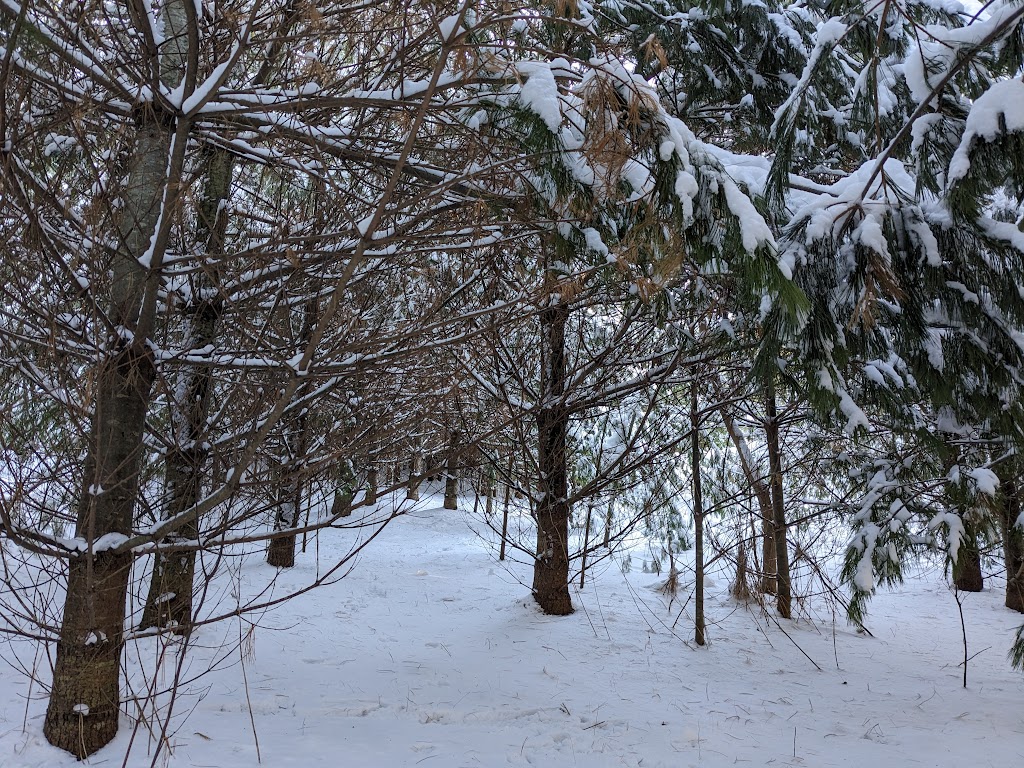Tarot card of the day: Nine of Cups
Today, on the day before darkest day, in this midwinter season, I want to think about contentment in absence. John O’Donohue meditates a great deal on absence in Eternal Echoes. He says it is sisters with presence: “the opposite of presence is not absence, but vacancy; where there is absence there is still energy, engagement, longing. Vacancy is neutral and indifferent space. It is space without energy. It remains blank and inane, untextured by any ripple of longing or desire” (317).
Winter is a kind of absence, though we fear it as something vacant. The trees have all lost their leaves and stand in naked fortitude. Like the dark that embraces all, a winter forest asks that we face our truth we’ve come to find summer comfort in hiding from ourselves. The winter forest with slim bare branches that pierce a gray sky show us what it’s like to be content without the indulgence of things. Winter disrupts our idle slip into thinking we always need more once we’ve gotten some. I think of Oliver Wendell Holmes Sr’s poem “Contentment” where he lists the things he just needs; one stanza for example:
Jewels are baubles; ’t is a sin
To care for such unfruitful things;—
One good-sized diamond in a pin,—
Some, not so large, in rings,—
A ruby, and a pearl, or so,
Will do for me;—I laugh at show.
Each of his stanzas he begins needing nothing, but then he needs next to nothing, then, well, maybe he could have something after all. And that’s okay. But his mocking tone suggests once you want one thing you thing you need another (this is an entirely different story about cats of course, as I recall a sign my mother keeps in her kitchen: “One cat leads to another and another and another”…perfectly acceptable). What standard you begin with can easily shift into a higher standard. “If you are driven by needs and inner forces of which you are unaware, then your behavior and actions are not free; you only partly belong to yourself” (O’Donohue 327). The contentment in the Nine of Cups that rises up for me today on the day before darkest day is a contentment with a presence that sisters absence. When presence sisters absence we are not driven by others’ needs we’ve imposed upon ourselves, but instead root into ourselves as our own guides.
Ada Limon has two poems that show what this could be like: “The Magnificent Frigatebird” and “Miracle Fish.” In “The Magnificent Frigatebird” the speaker begins by thinking about how a writing mentor once told her “You can’t start a poem with a man looking/ out a window. Too many men looking out a window.” She muses to herself, what about a woman? Could a woman look out a window? She subverts the voice that insists she be, or not be, a certain way, and in so doing discovers beauty. She continues after posing that question: “Today is a haunting….We swallow dead things” (the dead things being, literally here, following writing axioms such as you can’t start a poem by looking out a window). Then she remembers being awed once by large seabirds flying over the South Atlantic Ocean, which turned out to be Magnificent Frigatebirds. “What a pleasure to say, I am Magnificent. And, too, they traveled as a team,/ so I wondered if they named each other” the speaker says. She wishes to name all the ones she loves with such generosity: “You are Resplendent. You are Radiant. You are Sublime.” The poem ends with the speaker knowing she can’t fly like the Magnificent Frigatebird, but she can “imagine rapture” nevertheless. There’s a subtle recognition of presence in the speaker’s absence here, all of which is grounded in resisting her mentor’s admonition that a poem should never begin with a man looking out a window. But a woman, Limon’s poem asks? That’s a different matter. And this woman takes us to a place where we can revel in her small, but powerful, joy.
In Limon’s poem “Miracle Fish” there is a similar tension between the minute and the cosmic, with a fish and God. She tells three brief stories: one, about how she once pretended to pray to God and was marveled at how powerful the voice of prayer must be to reach “beyond the universe.” She describes dirt she knelt in at a chapel which had a sign that warned not to play in the “blessed earth” there—and she says, “But I swear I will play on this blessed earth until I die.” Her final story is of a fish who she tells of to reveal how she learned her fortunes were moved not by a Miracle Fish, but her “body’s water”, “that the massive ocean inside me was what made the fish swim.” These three brief stories show what it’s like to be not only content with the mundane powers of the self, but indeed revel in them, for we contain an immeasurable presence, if only we stop searching for those grand and cosmic things, hold still gently, and listen to the stories our bodies tell.
The naked winter forest reflects to us that deep twinning of presence and absence. It shows us how to belong ourselves.
Holmes, Oliver Wendell Sr. “Contentment.” Poetry Foundation. https://www.poetryfoundation.org/poems/44380/contentment-56d2237388193
Limon, Ada. “The Magnificent Frigatebird.” Poetry Foundation. https://www.poetryfoundation.org/poems/162175/the-magnificent-frigatebird
“Miracle Fish.” Poetry Foundation. https://www.poetryfoundation.org/poems/161842/miracle-fish
O’Donohue, John. Eternal Echoes, Exploring Our Hunger to Belong. Bantam Press, 1998.
I’m also in debt to a woman poet I heard read aloud her poem “The Season of Sticks” at Dark City Poet Society open mic on 12/17/24. I don’t remember her name, but her poem, about winter-naked trees, got me thinking about winter forests and what we can learn from them.

